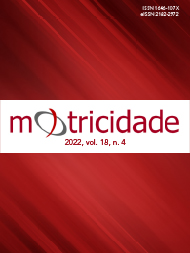What Portuguese coaches and media advisor's think about the importance of the media and its impact on professional soccer?
DOI:
https://doi.org/10.6063/motricidade.26039Keywords:
Media, Soccer, Coaches, Communication advisorsAbstract
The present study aimed to analyze the influence of the media in professional football by considering the perception of clubs' coaches and communication advisors. The sample consisted of a group of five communication advisors and seven coaches from Portuguese football clubs, to whom a semi-structured interview from the first and second leagues was applied. The responses obtained were analyzed using a qualitative content analysis methodology.
The results obtained show that the media are positioned as an important influencing factor in the players' performance. The massification of information and sports content as well as the transformation process that sports communication goes through thus positioned them. Due to the unequivocal effect of the media, some coaches report an environment of tension around their players, which has led to the application of psychological and communicational strategies capable of motivating their athletes towards success. However, the interviewees' perception of the importance of being continuously informed is relevant, causing a need for closer monitoring. The solution offered was internal training for professional football players and coaches in order to obtain a better communication efficiency for the clubs.
We found, in short, that the media advisors and coaches interviewed consider the media to be a relevant factor of influence over professional football, with the potential to provoke teams, namely, lack of confidence, cohesion and tension.
Keywords: Media; Soccer; Coaches; Communication Advisors
Downloads
Published
Issue
Section
License
The authors of submitted manuscripts must transfer the full copyright to Journal Motricidade / Sílabas Didáticas Editions. Granting copyright permission allows the publication and dissemination of the article in printed or electronic formats, and copyrights start at the moment the manuscript is accepted for publication. It also allows Journal Motricidade to use and commercialise the article in terms of licensing, lending or selling its content to indexation/abstracts databases and other entities.
According to the terms of the Creative Commons licence, authors may reproduce a reasonable number of copies for personal or professional purposes, but without any economic gain. SHERPA/RoMEO allows authors to post a final digital copy (post-printing version) of the article on their websites or on their institutions' scientific repository.


